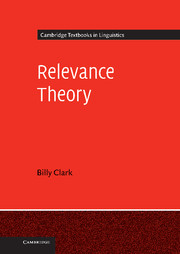Book contents
- Frontmatter
- Contents
- List of Figures and tables
- Preface
- Acknowledgements
- Typographical conventions
- Part I Overview
- Part II Details and developments
- 5 Explicature and implicature
- 6 Types of explicature
- 7 Types of implicature
- 8 Lexical pragmatics
- 9 Figurative language: metaphor
- 10 Figurative language: irony
- 11 Linguistic semantics
- 12 Conclusion: applications and recent developments
- Appendix Key notions of relevance theory
- Notes to chapters
- Bibliography and other resources
- Index
6 - Types of explicature
from Part II - Details and developments
Published online by Cambridge University Press: 05 June 2013
- Frontmatter
- Contents
- List of Figures and tables
- Preface
- Acknowledgements
- Typographical conventions
- Part I Overview
- Part II Details and developments
- 5 Explicature and implicature
- 6 Types of explicature
- 7 Types of implicature
- 8 Lexical pragmatics
- 9 Figurative language: metaphor
- 10 Figurative language: irony
- 11 Linguistic semantics
- 12 Conclusion: applications and recent developments
- Appendix Key notions of relevance theory
- Notes to chapters
- Bibliography and other resources
- Index
Summary
Topics: utterances and propositions; words, concepts and the world; higher-level explicatures; strength of explicatures
Overview
The previous chapter looked at the way in which relevance theory draws the distinction between explicit and implicit communication, and at some of the differing views about how to draw the distinction. This chapter considers some of the properties of explicatures and some of the different kinds of explicatures which might be communicated. First, it considers the proposition expressed by an utterance. This is followed by a discussion of the relationships between words and concepts and between concepts and the world. Within relevance theory, the proposition expressed is the propositional form arrived at by fleshing out a linguistically encoded semantic representation. It is arguably always the case that the lowest-level proposition is embedded under other more complex representations and Section 6.4 looks at these ‘higher-level explicatures’ in more detail. The chapter concludes by considering the extent to which explicatures can vary with regard to the strength with which they are communicated. This includes considering poetic utterances where some of the details of the proposition expressed are not clear.
- Type
- Chapter
- Information
- Relevance Theory , pp. 200 - 215Publisher: Cambridge University PressPrint publication year: 2013



